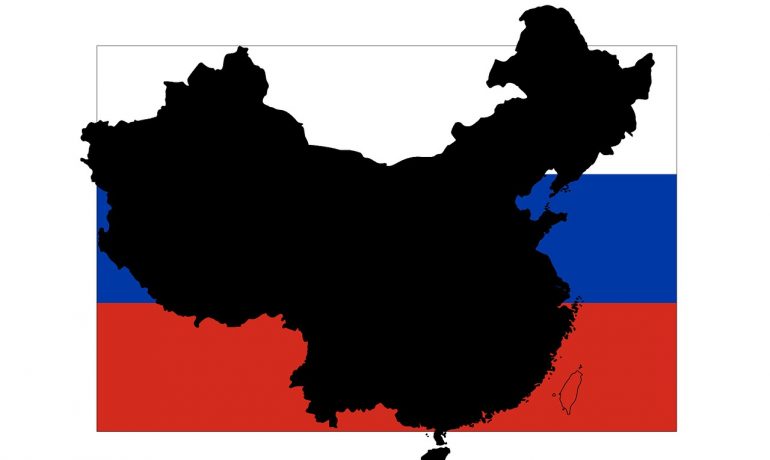Introduction
In February 2022 Vladimir Putin flew to Beijing to meet Xi Jinping on the eve of the Winter Olympics. The two leaders announced to the world that they had agreed a “no limits” partnership. They would work together on strategic issues to do with economics, energy and climate, as well as science and technology, and space. The two leaders announced a major new gas deal, valued at $117 billion, including the opening of a new gas pipeline, as Russia sought to shift its trade away from Europe. Strategically, the two leaders jointly voiced their opposition to further expansion of NATO, and support for China’s assertion of sovereignty over Taiwan. Despite the reported presence of almost 200,000 troops on its borders, President Putin denied that Russia planned to invade Ukraine.
The announcement signalled to the world that China and Russia were determined to provide a counterweight to western global power, both strategic and economic.
What a difference a year makes. Russia is bogged down in the war that Putin launched in Ukraine. And when Xi Jinping travelled to Moscow in March of this year, there was a notable reduction in the warmth between the two leaders. China declined to sign off the “Power of Siberia 2” gas pipeline, to the apparent surprise and discomfort of Russia. And while China continues to express its support for, and confidence in, President Putin, there are other indications that China may be taking a more rounded view of its relations with Russia.
A future built on a bitter legacy
In this blog, I will look at Sino-Russian relations, and possible future scenarios. But, as ever, when looking to the future, it’s essential to look to the past. First, a picture – which, of course, is worth 1,000 words. This French cartoon from 1898, shows an appalled Qing Dynasty mandarin looking on, while a gang of foreigners carve up China as if it were a cake. The foreigners are, Queen Victoria, Kaiser Wilhelm II of Germany, Marianne, the personification of the French Republic, a Japanese warrior and Tsar Nicholas II of Russia.
The cartoon encapsulates the humiliations heaped on China in the previous half century, as foreign powers overrode its sovereignty, and imposed a series of “unequal treaties”, allowing them to seize control of Chinese territory, and impose their own terms of trade.
When we hear the angry rhetoric of China’s “wolf warrior” diplomats, or read the posts on Chinese social media, we need to remind ourselves why there is such anger and hostility to foreign powers. China’s ambition to become a global superpower owes a great deal to the historic humiliations inflicted on China. We should remember that the list of foreign powers includes Russia.
Vladivostok was established as the major city of the Russian Empire under unequal treaties imposed on China in 1858 and 1860. Chinese maps show the modern Chinese name (Haishenwai) in Chinese characters. The annexation of this region still rankles with Chinese nationalists, just as much as the slights their country suffered at the hands of the western powers and Japan. In the prevailing spirit of co-operation, Russia has opened up Vladivostok to Chinese shipping and trade, and Chinese businesses and agencies are moving back in numbers, at the same time as Russia’s population declines, especially in the East. Will this be enough for China, as it becomes the dominant partner in the relationship?
As recently as 1969 there was armed conflict between China and the former USSR involving disputes over the borders imposed in the unequal treaties. Although there was no declaration of war, and hostilities were ended after negotiations between Alexei Kosygin and Zhou Enlai, the conflict drove China to seek to strengthen its position by opening diplomatic channels to the USA. This obscure not-quite war led to the historic trips to Beijing by Henry Kissinger in 1971, followed by President Nixon a year later.
China’s ambition to be a superpower does not depend on its relations with others. It suits China to be allied with Russia for geographical, strategic and environmental reasons. But it is increasingly clear that the alliance is not one of equals. China seeks to match the USA as a superpower in its own right. Xi Jinping made this clear at the Chinese Communist Party Conference in 2017, and repeated it in the next one in 2022, where he spoke about China and Chinese power. The poor performance of the Russian military, and Russian equipment in Ukraine will also be leading China to review its own military infrastructure, much of which has been based on learning from its neighbour.
Two recent developments underline China’s willingness to take action that seems to run counter to its alliance with Russia. As mentioned earlier, China chose not to sign off the “Power of Siberia 2” gas pipeline, and seemed to decide this without consulting Russia. This linked article concisely sums up the dominance of China in the relationship.
On a related theme, China is developing closer economic and strategic links with its Central Asian neighbours. In the process it is supplanting Russia as the dominant power in that region – which was until 1991, part of the USSR.
Five Scenarios
Looking forward, what might this historic legacy mean for the relationship between China and Russia. It needs to be understood that the future will not be decided by the two parties exclusively: the future will depend on other factors, none of them entirely in either power’s control, including:
- The outcome and the duration of the Ukraine War: a quick win for Russia seems unlikely, and a defeat would weaken it, both at home, and in its relations with China: its best hope is to avoid defeat;
- The state (and stability) of the global economy: further economic shocks would be destabilising, and the damage to food supplies of a continuing Ukraine War will lead to pressure for a settlement of some sort, which may or may not help Russia;
- The impact of climate and environmental change on the world, which may accelerate demand for renewable energy – China already leads the world in investing in wind and solar, which is not helpful to Russia’s strategic economic interests; and
- Relations between other powers and potential and actual blocs, including NATO, ASEAN, the AUKUS strategic alliance, and the rise of India.
The likelihood of each of the scenarios listed below will be influenced by these uncertain, but key drivers.
Scenario 1 – Osmosis
The pull of China is stronger than the pull of Moscow. China is the biggest market for Eastern Siberia’s timber, oil and gas, and Chinese trade dominates Vladivostok/Haishenwai. Chinese people continue to move into Siberia in search of opportunities. China runs everything, and Chinese infrastructure keeps it working, even if the names on the doorplates are still Russian. Young Siberians can either choose to go to China to study, or move west to remain in a more culturally Russian culture.
Scenario 2 – Nova Alaska
The growth of Chinese investment and settlement in Eastern Siberia, added to a combination of economic, military and strategic problems affecting Russia, lead China to make Russia “an offer it can’t refuse”: a massive cash sum, and access to a Belt & Road investment programme in return for a transfer of historic territories back to Chinese sovereignty. Lands that transferred under the unequal treaties revert to Chinese rule and identities.
Scenario 3 – Secession
The effects of Russia’s war in Ukraine lead to a collapse of central authority. Russia’s outlying regions use this as an opportunity to secure greater autonomy for themselves, fed by resentment at the use of local natural resources for Moscow’s gain, and the loss of h many thousands of young men in what appears to be an unending war in Ukraine. Eastern Siberia concludes that it would be better off if it tilted towards China, and begins to develop its own relations with Beijing, and encourages inward investment from China.
Scenario 4 – The Emperor’s Revenge
The temptation to avenge historical injustice grows as Russia becomes weakened by the war in Ukraine. Reunification becomes a one-word slogan across Chinese media and social media. Nationalists within the Chinese Communist Party see recovery of Eastern Siberia as a potential gain for China in terms of power, prestige and access to natural resources. China presents this as a blow against historic colonial injustice. Russia is not happy, but there is little sympathy for it.
In conclusion, the No Limits Alliance provides no real indication of how Chinese and Russian relations will evolve. China would no doubt prefer a stable and friendly Russia, but it may be beginning to wonder whether this is realistic, given events since Putin’s invasion of Ukraine. Russia will be wondering how far it is able and willing to submit to Chinese overlordship without being swallowed up, at least in parts.
Written by David Lye, SAMI Fellow and Jonathan Blanchard Smith SAMI Fellow and Director
The views expressed are those of the author(s) and not necessarily of SAMI Consulting.
Future-prepared firms outperform the average by 33% higher profitability and 200% higher growth. SAMI Consulting brings 30 years of experience delivering foresight, futures and scenario planning – enabling companies and organisations make “robust decisions in uncertain times”. Find out more www.samiconsulting.co.uk.
If you enjoyed this blog from SAMI Consulting, the home of scenario planning, please sign up for our monthly newsletter here and/or browse our website.
Featured image by Gerd Altmann from Pixabay


